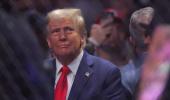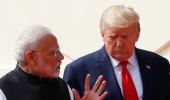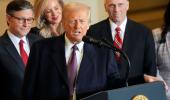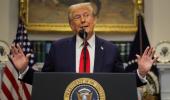'We have to be prepared for the larger disruption that is likely to take place.'

An escalation of trade war between the United States, Canada, Mexico, and China could increase the threat of dumping of goods to India, experts have warned.
New Delhi is in wait and watch mode as US President Donald J Trump unleashed a 25 per cent tariff on imports on Canada and Mexico, and a 10 per cent levy on Chinese imports. These tariffs will take effect from Tuesday, February 4, 2025.
Even though Trump has repeatedly labelled India a high-tariff nation, he has yet to take action against New Delhi.
Ajay Sahai, director-general and chief executive officer, Federation of Indian Export Organisations, said US tariffs on Chinese goods would increase the cost of products.
"This may give a competitive edge to Indian products over Chinese goods due to lower tariff," Sahai said.
There may, however, be a risk of uncertainty among exporters due to unpredictability of the future of tariff impositions.
For over a month, the commerce department officials have closely studied the opportunities and challenges -- in terms of if there are tariffs -- whether for all countries or country-specific, how it can impact specific sectors and what can be the mitigation effort.
India has identified electronics, pharmaceuticals, textiles, auto components, and chemicals to boost exports to the US amid possibility of a trade war between Washington and Beijing.
Biswajit Dhar, distinguished professor at Council for Social Development, said it is yet to be seen whether India is able to take advantage of higher tariffs on other countries. He asserted that New Delhi needs to be prepared.
"We have to be prepared for the larger disruption that is likely to take place. Trump has already talked about the reciprocity principle with respect to tariff and India should be concerned about that," he added.
Trump has signed orders to impose steep tariffs on imports from Mexico, Canada, and China. This amounts to a 25 per cent additional tariff on imports from Canada and Mexico and a 10 per cent additional tariff on shipments from China.
Energy resources from Canada will have a lower tariff of 10 per cent. Retaliatory measures followed almost immediately with Canada announcing a 25 per cent tariff and Mexico also threatening tariff and non-tariff measures.
China is planning to challenge it at the World Trade Organisation.
India, dubbed a 'tremendous tariff maker', has, so far, ducked tariffs from its largest trading partner. Will it be next in line or go unscathed?
Some sectors are cautiously optimistic, hoping to cash in on the presumptive void created by Canada, Mexico and China.
For India's auto component industry, the US remains the largest export market and some industry leaders see the imposition of tariffs as an opportunity to expand their footprint in the US.
A senior executive from a Delhi-based auto-component firm pointed out buyers in the US might urge Indian suppliers to establish manufacturing units there to circumvent potential trade barriers. "This could ultimately help expand their business base," the person said.
According to the Automotive Component Manufacturers Association of India (ACMA), the industry exported gear worth $11.1 billion worldwide in the first half of 2024-2025. Of this, nearly 28 per cent -- $3.67 billion -- was shipped to the US.
Trade policy analyst S Chandrasekaran says agriculture and auto components were immediate beneficiaries in India.
"There is an immediate opportunity of around $20 billion food and agriculture market opening up and a large share of auto components may also get sourced. This is a great chance for the auto component and agricultural sectors," Chandrasekaran said.
There is also a view that China may look to reroute its goods through trade-surplus countries to the US, like the UK, and also some other markets like Vietnam, Dubai, and Singapore.
According to Tiruppur Exporters’ Association President K M Subramanian, if textiles are part of this, Indian companies are expected to see a considerable surge in orders.
A Delhi-based firm, however, noted that India's share in the US’s auto component imports remained modest -- 1 to 2 per cent -- making it unlikely that Washington will take immediate restrictive measures.

The Indian pharma industry is also closely watching the space.
Sudarshan Jain, director general, Indian Pharmaceutical Alliance which represents the large and research-driven domestic pharmaceutical companies that account for almost 80 per cent of India's pharma exports, told Business Standard the industry was watching out.
Some pharma industry veterans say India will continue to have a cost advantage even if tariffs are imposed.
An industry executive who has headed the Indian arm of a US multinational said: "If tariffs are imposed, exporters will simply add that to the cost. This is unlikely to change much dynamics in that market."
Uday Bhaskar, former director general, Pharmaceutical Exports Promotion Council (Pharmexcil), said China was not very strong in generics and did not export much to the US.
"China exports largely active pharmaceutical ingredients and intermediates and chemicals. We may have a chance to export these, but then again we are dependent on China," Bhaskar said.
As trade flows become realigned, there are worries of supply-chain disruptions.
"India is vulnerable with rising imports from various countries and hence the situation will need to be monitored," said Jayant Acharya, joint managing director and CEO, JSW Steel.
Ranjan Dhar, director and vice-president (sales and marketing), ArcelorMittal Nippon Steel India, said as global trade rebalanced, China's continued high-steel production would lead to excess supply, which it would redirect to any available market.
Photographs curated by Anant Salvi/Rediff.com











 © 2025
© 2025